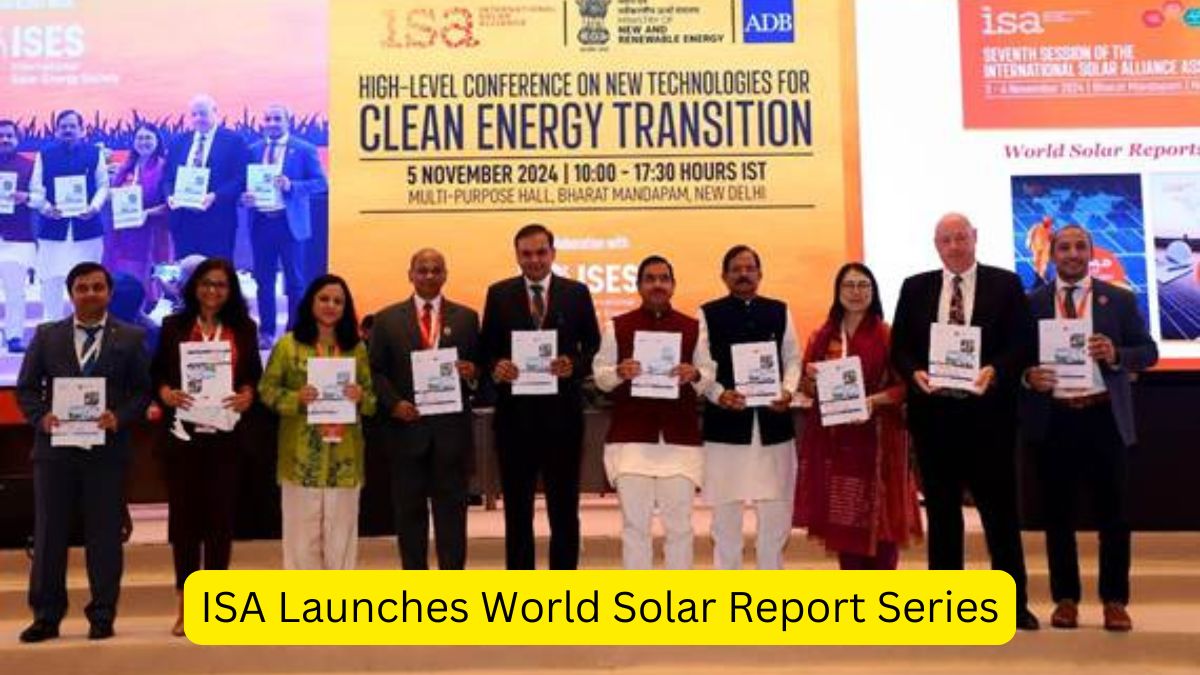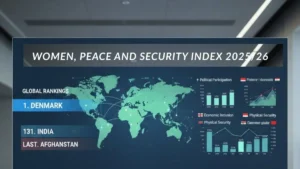The 3rd edition of the World Solar Report series was launched at the 7th Assembly of the International Solar Alliance, spotlighting key areas in the global transition to sustainable energy. This year’s release includes four reports: the World Solar Market Report, World Investment Report, World Technology Report, and Green Hydrogen Readiness Assessment for African Countries.
Release Details
- Launched at the 7th Assembly of the International Solar Alliance (ISA) by Pralhad Joshi, India’s Minister for New and Renewable Energy and President of the ISA Assembly.
- First introduced in 2022, this report series provides comprehensive insights into the global solar industry’s progress, challenges, and investment trends.
Focus Areas of the Report Series
- The report series covers global solar growth, investment trends, technological advancements, and green hydrogen potential in Africa.
- Comprises four reports, World Solar Market Report, World Investment Report, World Technology Report, and Green Hydrogen Readiness Assessment for African Countries.
Individual Reports Summary
World Solar Market Report
Solar Capacity Surge
- Global solar capacity skyrocketed from 1.22 GW in 2000 to 1,418.97 GW in 2023, showing a 40% annual growth rate.
- In 2023, solar power additions accounted for 345.83 GW—75% of all new renewable capacity.
- Solar generation has reached 1,628.27 TWh, a significant increase from 1.03 TWh in 2000.
Manufacturing Capacity
- By the end of 2024, solar manufacturing capacity is projected to exceed 1,100 GW, over twice the anticipated demand.
- Solar cell prices have dropped to $0.037/watt, and advanced module prices (TOPCon and PERC) are below $0.10/watt.
Job Creation
- Solar industry jobs reached 7.1 million in 2023, a 44% increase from 4.9 million in 2022. Notably, 86% of these jobs are concentrated in ten countries.
Future Projections
- Global solar capacity may rise to between 5,457 and 7,203 GW by 2030, driven by commitments under the Paris Agreement.
World Investment Report: Shift in Global Energy Investments
Investment Growth
- Global energy investments are projected to grow from $2.4 trillion in 2018 to $3.1 trillion by 2024, with a 5% annual growth rate.
Renewables Lead
- Clean energy investments, nearly doubling those in fossil fuels, are expected to rise from $1.2 trillion in 2018 to $2 trillion by 2024.
Solar’s Investment Dominance
- Solar attracted around 59% (USD 393 billion) of total renewable energy investments (USD 673 billion).
Regional Insights
- APAC led solar investments in 2023, investing USD 223 billion.
- EMEA invested USD 91 billion, and AMER contributed USD 78 billion to solar projects.
World Technology Report: Solar Technology Breakthroughs
Efficiency Advancements
- Monocrystalline solar PV modules have reached a record 24.9% efficiency, enhancing solar power’s potential.
Material Innovation
- The manufacturing process now requires 88% less silicon per watt than in 2004, reflecting both efficiency gains and cost reduction potential.
Cost Reductions
- The levelized cost of energy (LCOE) for utility-scale solar PV has dropped by 90% from 2010 to 2023, reaching $0.044/kWh.
- Country-specific declines in utility-scale PV costs range from 76% to 93%.
Green Hydrogen Readiness Assessment for African Countries
Need for Green Hydrogen
- Direct electrification alone cannot decarbonize industries dependent on fossil fuels, such as steel, fertilizers, and refined fuel production.
Production Process
- Green hydrogen, generated via renewable-powered electrolysis, provides a clean substitute for coal, oil, and gas.
African Potential
- Countries like Egypt, Morocco, and Namibia have been identified for their renewable resource availability, supporting green hydrogen’s role in industry decarbonization and job creation.
High-Level Conference on New Technologies for Clean Energy Transition
- Organized by ISA alongside the Ministry of New & Renewable Energy (India), Asian Development Bank (ADB), and the International Solar Energy Society (ISES).
- Aimed at driving real-world impact through dialogue on new-age solar technologies, storage solutions, and solar’s role in equitable development.
Overview of the International Solar Alliance (ISA)
- The International Solar Alliance (ISA) is an international organization committed to promoting solar energy globally, with a membership of 120 countries.
- Established to enhance energy access, security, and sustainability, ISA supports countries in adopting solar energy as a clean, renewable source essential for a carbon-neutral future.
- Headquartered in India, ISA was founded with the signing and ratification of its Framework Agreement by 15 countries on December 6, 2017, marking it as the first intergovernmental organization headquartered in India.
| Summary/Static | Details |
| Why in the news? | 3rd Edition of World Solar Report Series launched at the 7th Assembly of the International Solar Alliance (ISA). |
| Released By | Pralhad Joshi, President of ISA Assembly and India’s Minister for New and Renewable Energy. |
| Reports | 1. World Solar Market Report
2. World Investment Report 3. World Technology Report 4. Green Hydrogen Readiness Assessment for African Countries |
| Overview of World Solar Report Series | First introduced in 2022, provides an overview of global solar progress, investment trends, challenges, and technological advancements. |
| High-Level Conference | Held alongside the 7th ISA Assembly. Co-organized with India’s Ministry of New & Renewable Energy, the Asian Development Bank, and the International Solar Energy Society. |
| Conference Objectives | Drive actionable change in solar technology and policy for a clean energy transition. Focus on emerging technologies, storage, and the role of solar in socio-economic development. |
| About ISA | – Founded: December 6, 2017, headquartered in India.
– Mission: $1 trillion solar investment by 2030, promoting affordable solar. – Partnerships: MDBs, DFIs, private/public sector collaborations to aid LDCs and SIDS. – Initiatives: Policy support, investment mobilization, cost reduction, training, and data access for stakeholders. |




 AI@Work: Driving Productivity, Jobs, and...
AI@Work: Driving Productivity, Jobs, and...
 Global Billionaire Wealth Reaches $15.8 ...
Global Billionaire Wealth Reaches $15.8 ...
 Denmark Tops, Afghanistan Last! Where Do...
Denmark Tops, Afghanistan Last! Where Do...








